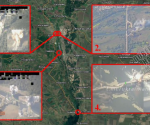Britannia waives the rules: oil tanker theatre for preserving ongoing effort to restrict Iranian infrastructure
How people would have today’s propaganda served to them with control grid technology of the 1940s:
“Britannia rules the waves” shouts the movie-theatre newsreel voiceover actor, “our boys (and girls [in smug tone]) see off those pesky Iranians trying to board one of our oil tankers. One look at the bristling guns of HMS Montrose was enough to deter a high crime on the high seas.”
The pictures underneath the excited barking would have had to be staged, of course, given that no filmic record existed of the incident described. Able seaman Chalky White, browned-up with tan Kiwi and shouting “dirka-dirka”, would thrash a dinghy, full of similarly attired and franticly ululating shipmates, through choppy Portsmouth Harbour waters off of Whale Island. It would only appear hilarious to those who understood it to be a fake, but it would certainly impress any old ladies in the audience.
The newsreel report would end: “meanwhile, in good-old Gibraltar, the stalwart natural fortress against evil, the Iranian oil tanker impounded last week by the daring Royal Marines, as it tried to sneak its illegal cargo to the Syrian dictator and barrel-bomb murderer, Assad, drew further condemnation from the British Government today when it was discovered to be non wheelchair friendly.”
In fact, the UK Government would do as well as to cite contravention of equality and diversity orthodoxy for all the justification it had to seize the ship using the excuse of EU sanctions against Syria.
To recap events, because it must not be assumed that the reader is aware of them, on 4th July, the Royal Navy captured an oil tanker as it sailed into what Gibraltar and Spain both call its own territorial waters (this is significant, as will become clear). The Gibraltarians, and therefore the British Government, made a claim that the ship was headed to Syria, was full to the brim with crude oil, and thus was not to be permitted to continue on grounds of enforcing said sanctions.
The ship, the Grace 1, Iranian-owned, and sailing under the Panamanian flag, set off from Khor Fakkan in the United Arab Emirates after delivering a cargo there in January of this year – and having remained a good time in the same port listed as “floating storage”. It journeyed around the southern tip of Africa, according to the Riviera Maritime Media website, to arrive in the Mediterranean fully laden [the “dumb question” one wants to ask is, where was the “Iranian oil” it is supposedly carrying loaded on board?]. Again, according to Riviera Maritime Media – citing Gibraltar authorities – the Grace 1 sailed freely into British Gibraltar Territorial Waters (BGTW) “on a pre-arranged call for provisions and spare parts”. Evidently, the captain of the Grace 1 did not think he was engaged in activity that the British would deem illicit. Indeed, given the voluntary manner in which the Grace 1 exposed itself to abduction in British waters, there is no reason to be suspicious of the vessel not travelling through the Suez canal – which is a talking point in various media to support an idea that the Grace 1 wanted to avoid the maritime authorities of other nations.
While there seems to have been remonstrations out of Iran to complain that the vessel was not bound for Syria, this information could well have been words placed in Iranian mouths by Anglo-globalist (US/UK/etc) corporate-media [and as a matter of fact, the author would ask the reader how he knows the destination is Syria, and not any other place]. Officially, the Iranians have characterised the British seizure of the Grace 1 as an act of piracy, with the Foreign Minister, Javad Zarif, pointing out by tweet that Iran is not a member of the EU to have to abide by its sanctions.
In the midst of a wag-the-dog hysteria, it would be too much to expect any clear sightedness coming from the British side – although one of his lordships (Howell) at Parliament asked “was [it] such a good idea to raid the Iranian oil tanker in Gibraltar in the first place[?]” (see the Guardian piece about to be introduced). Be that it as it may, it occurs to the author, at least, that if Iran bides its time, its tanker will have to be released, or the British will have opened a can of worms in terms of precedent that may well test its own resources to find them lacking (there is a lot of water on the planet, and not all of it washes up on Iranian shores). Moreover, there is a lot of the world that isn’t part of the Anglo-globalist core, nor even in its orbit – which, as it is, sees nations inching away from their satellite status at quite a steady rate these days to set up station in relation to Russia. It is not an exaggeration to say that Britain risks becoming a pariah nation in real terms, and has long since been one that is not to be trusted: for the least one can say is that the true meaning of the “rules-based international order” is made patently clear by such conduct. When it is one rule for Britain, and another rule for everyone else, who wants to be in that club? As Zarif tweeted, “Last I checked, EU was against extraterritoriality.”
And so, it would appear that there is little advantage for Iran, at this stage, to be gained in seizing a British tanker in retaliation for the taking of the Grace 1- but this is exactly what Anglo-globalist corporate-media has implied to its audience would be Iran’s intent. Of course, when one digs just a little bit, this appraisal is found to be based on material that doesn’t warrant it (from Reuters):
“If Britain does not release the Iranian oil tanker, it is the authorities duty to seize a British oil tanker,” tweeted Mohsen Rezaei, who is now secretary of Iran’s Expediency Council, a powerful state body.
What is being written about here is a statement regarding perceived justification in law for some future act conditional on Britain’s next move. It does not call for retaliation for the seizure of the Iranian tanker.
Without a shadow of a doubt, the Anglo-globalist corporate-media (working as agents of Government, of course) have been exaggerating the danger, and its imminence, from Tehran to British shipping. Indeed, the British Government itself has, in the previous 48 hours, put ships sailing through the Persian Gulf on high alert to encourage the perception – after translation into common appreciation via Sky News, of course.
Additionally, there has already been a good deal of anti-Iranian theatre involving ships already present in the region, and if it hasn’t been magnified into a spectacle by corporate-media making a mountain out of a mole hill alone, then we cannot discount the idea that the captains of the vessels got instructions to play along. First of all there was the Pacific Voyager; the following is from the Metro, 6th July:
A British registered tanker which began drifting off the coast of Iran caused a major scare this morning, with fears that Iranian forces had boarded the vessel. The Pacific Voyager tanker was en-route from Singapore to Ras Tanura, Saudi Arabia, when it slowed down and stopped around 6am today. Iranian officials denied that they had boarded the boat.
From this it should be obvious that all a corporate-media “journalist” and its editor need do to ratchet up tension is take normal activity, call it something else, and invent a reaction from nameless “Iranian officials” who wouldn’t have heard of the ship. The Riviera Maritime Media site explains that:
News reports highlight British-flagged tanker Pacific Voyager “veering” off course, but United Kingdom Maritime Trade Operations explain the tanker was “adjusting its arrival time at the next port”.
The second was a story that developed over a number of days – obviously so as to create tension that could be resolved with the introduction of the notion of Royal Navy escorts as solution. The Riviera Maritime Media site introduces this saga more than adequately:
News reports claim BP Shipping-operated tanker British Heritage has “cancelled” a voyage to Iraq’s Basrah terminal to avoid sailing near to Iran’s coast, citing unnamed sources.
The British Heritage was reported on 8th July as having performed “an abrupt u-turn on July 6” to sit off the coast of Saudi Arabia for fear that “it could become a target if Iran seeks to retaliate for the seizure… of the tanker Grace 1”. On 10th July, Sky News reported that a Royal Navy frigate, HMS Montrose, was “shadowing” the British Heritage -“not officially escorting the tanker but has provided additional protection while it travels through the Gulf.” With great interest we note that this specific news item mentions the Pacific Voyager – which, now we learn, also received the same attention from the same Royal Navy ship for “a little way” the day before, “a second defence source said”. Thus, with the use of a technique that retrospectively colours an old case, that doesn’t deserve it, with the taint of the new one, it can be said for certain that the British Heritage saga was conceived as a PR exercise; if the ships interacted with each other as described, then they were doing so according to a script.
And to the final act, 11th July (from the BBC):
Iranian boats tried to impede a British oil tanker near the Gulf – before being driven off by a Royal Navy ship, the Ministry of Defence has said.
HMS Montrose, a British frigate shadowing the tanker British Heritage, was forced to move between the three boats and the tanker, a spokesman said.
He described the Iranians’ actions as “contrary to international law”.
Iran had threatened to retaliate for the seizure of one of its own tankers, but denied any attempted seizure.
Boats believed to belong to Iran’s Islamic Revolution Guard Corps (IRGC) approached British Heritage and tried to bring it to a halt as it was moving out of the Gulf into the Strait of Hormuz.
Getting to the exact truth of this is hampered by a lack of knowledge about the location of the British Heritage. If it was in Iranian waters, then Iranian naval ships had every right to be in the vicinity. Again, take some normal behaviour, call it something else, and throw in an Iranian denial.
As it happens, Fars News reported a statement from the IRGC denying any encounter between their vessels and foreign ships. That being said, the most interesting part of the IRGC’s statement was the promise “to ‘act swiftly and decisively’ should they receive an order to capture any foreign ship.” It reminds of how the incident of June 20th, in which an American drone was shot down, should teach that Iran is not intimidated by the prospect of a military escalation; realistically, we should expect that if Iran really wanted to seize a British tanker, then the Royal Navy’s decision making would be a lot tougher than whether to get between some small boats and a tanker: it would be fight and possibly die, or surrender – as crew of HMS Cornwall did in 2007. The Iranians have already demonstrated that they would not be timid.
As previously asserted, the tale of the British Heritage, culminating in the Royal Navy muscle-flexing, has been mere theatre. Therefore, the issue that should be exercising those trying to make sense of the world should have nothing to do with any real prospect of ever-rising tension concluding in war, but rather, for what purpose is the UK Government pretending that Iran wants to confiscate an oil tanker.
Patrick Wintours, the diplomatic editor of the Guardian – who naturally works on the basis that there is an actual Iranian threat to British shipping – writes that the US may be trying to edge Britain out of involvement with the Instex trading scheme that works around US embargoes on Iran. Indeed, it is now evidently common knowledge that Britain was asked to detain the Grace 1 by the US – Spain let the cat out of the bag when it didn’t like the British shoving shipping around in what it says are its territorial waters. The US, or so the consensus says, is the instigator of the whole episode. If what Wintours proposes is true, then the exercise is not about provoking Iran into retaliation, but only about creating bad feeling between Britain and Iran. And this could make sense knowing, as we do, that the last thing the Americans would want is a retaliation from the Iranians. Granted, this might not have been the case when the Trump regime embarked on its current course of action and left the Iranian nuclear deal brokered by the Obama-era administration (the Joint Comprehensive Plan of Action [JCPOA]), in May 2018. It perhaps wasn’t clear to the Americans back then that they were in the midst of an embarrassing loss of military virility (a well-kept secret for Anglo-globalist media audiences – but something that has been covered at FBEL, here). As a result, we will see that Wintours is right in one respect: with sanctions being the US’ only weapon against Iran, work-arounds to them have become intolerable.
The author believes that the theatre of oil tankers being escorted by military vessels is all to do with maintaining perceptions held by the American public, especially, in order to maintain sanctions. For a start, with Iran having called the US’ military bluff, a show of might that is fabricated only to appear as such can only hold weight with the easily propagandised prey that is domestic audiences. What has not been mentioned yet is that before the Ministry of Defence spoke on any incident involving HMS Montrose, the US corporate-media had announced it as fact. Wintours acknowledges this in his piece:
Curiously, media briefing about British Heritage, and the intervention by HMS Montrose, which warded off the Iranian boats by aiming its guns at them, came originally from the US, and not the Ministry of Defence.
The prize for the American Government in such an undertaking would be exactly the sort of headline that has since been produced by CNN:
Iran shows growing fury in the Gulf. It really is desperate to talk
What is being revealed is that this is about selling Trumps’ Iran strategy to the American people – look, says CNN, Iran is lashing out because it wants to come to table – or, it wants to concede to America. Moreover, the Grace 1 incident, and all its fall out, coincides with talk from the American Government of instituting regular escorts for oil tankers to be carried out by a coalition of navies; therefore the fact of a maritime crisis incident that doesn’t directly involve the US (on face value) is meant to demonstrate to Americans that such an axis of power is required: the world, not just America, is threatened by Iran. It is this message that is exactly necessary for motivating a people who personally live thousands of miles away from Iran. Sanctions is the only weapon that the US has against Iran, and it needs an electorate that will endorse an administration that would inflict them.
Now, if we are to believe the likes of Wintours, there is dissent in the Anglo-globalist camp (including the EU), so that the US may not get all of its sanctions, let alone its navy patrols. Principally, Britain is the partner whose defiance of the US would be most significant. In his piece, Wintours reminds of a talking point that is definitely exercising a lot of debate in media whereby Britain would be isolated after Brexit if it does not adhere very strictly to the desires of the Trump regime; Wintours covers it in the following way:
Speaking on the BBC, Nathalie Tocci, the special adviser to the EU foreign policy chief, Federica Mogherini, put the UK decision [to impound the Grace 1] in a wider political context. “The UK is feeling its own fragility and a fear of isolation as it tries to cut off its membership from the EU. There’s a line connecting the Iran story and the UK ambassador to the US.”
In fact, the question of Britain’s estrangement from both the US and the EU is a red herring. The people who run the UK from London are the same as the people who run the US from Washington. As for the EU – it is a tool of London’s, although it has aspirations of its own. Please note that Spain actually did not object to the British action in the most important respect: that it was an act of piracy, wherever it took place. Indeed, the Spanish, despite stating a view that instructions had come from the US, did not interfere because they agreed in principle that the Grace 1 should be detained on the grounds of EU sanctions.
Crucial to getting to grips with the dynamic at work is understanding that the effort to restrict Iran’s experience with nuclear technology is nothing to do with preventing the development of weapons. Rather, it has always been about stopping the Iranians develop a complex infrastructure comparable to that of western countries. Such a situation in Iran would lead to a stable and powerful permanent roadblock to Anglo-globalist ambitions. We should note, with great interest, that uranium (and this is according to Wikipedia) needs to be enriched to about 4% to be useful in a nuclear reactor – and that the terms of the JCPOA restricts the Iranians to a level of enrichment of 3.67%.
The Trump regime’s characterisation of its predecessor in the White House as being soft on Iran is, of course, a misrepresentation. The goal has always been to restrict Iranian capacity for infrastructure, and the Trumpist rejection of the JCPOA was necessary to create a new dynamic for that purpose. While the EU would play good cop, keeping Iran bound to the agreement with carrots, and offer the means by which to acquire that which its Governments needed from Iran (the fact that Iran has exceeded enrichment levels signals Iranian comprehension that Instex is not enough), the US would play bad cop, with a stick to induce Iran to surrender and accept a deal that was even worse.
However, as referred to above, when the US left the nuclear deal, it perhaps didn’t realise that Iran could shoot its aircraft out of the sky with impunity (more or less). Thus, not only are sanctions the only weapon available to the US against Iran in terms if warfare by proxy, they will also inevitably have a detrimental effect against the development of infrastructure. As asserted above, in order to justify sanctions, the US, the Anglo-globalist (London) City/military amalgam-as-government, needs to create an impression of Iranian threat to the world, hence the theatre, and hence why Britain waived the rules to snatch Grace 1 (in fact, the author feels that the British had more than one reason to resort to piracy – but that is for another article).
Update, 13/7/19:
A development, today, as reported by the BBC:
Foreign Secretary Jeremy Hunt has said the Iranian tanker detained by Royal Marines near Gibraltar could be released, if the UK is guaranteed the oil is not bound for Syria.
This BBC also reminds that the Grace 1 was seized because “there was reason to believe… [it] was carrying crude oil to the Baniyas Refinery in Syria” (with emphasis added). The destination of the vessel has never been certainly known. Moreover, crew of the Grace 1, that had been arrested and have since been released, evidently could not give the answers that the British needed to be certain.


















